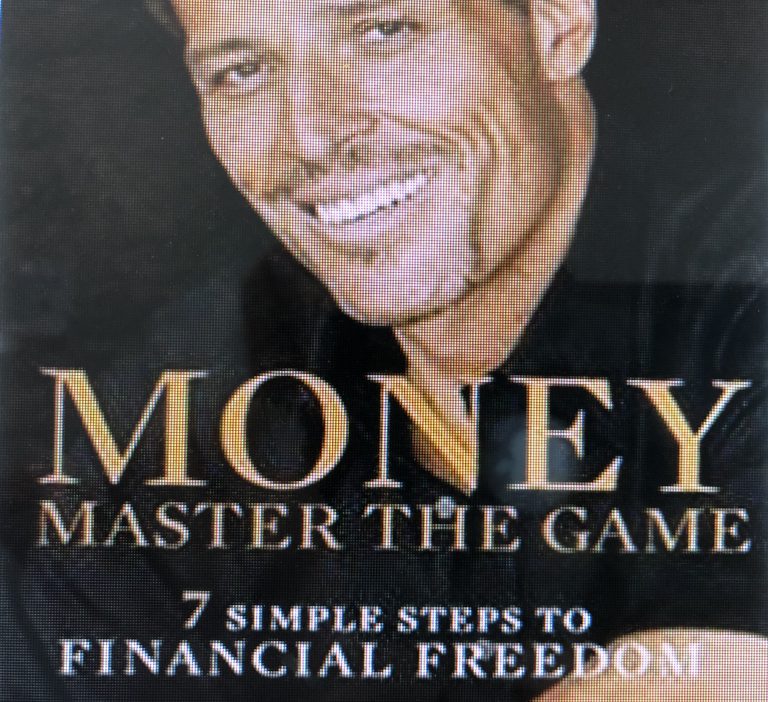Money: Master the Game by Tony Robbins is a truly groundbreaking book.
Tony is probably the richest self-help guru out there, and no matter what your opinions are about him, Money: Master the Game is an amazing book which is highly recommended for all by financial gurus like Paul Tudor, Kyle Bass, Ray Dalio, John Bogle and many more.
It’s an absolute must-read if you live in a developed country, the USA especially.
It breaks down and simplifies the process of securing your financial future in a way everyone can understand.
The beauty about it is that the advice in it doesn’t just come from Tony himself, but from the top people in financial management, giants whom most people can’t get access to.
Tony, who began his career promoting seminars for motivational speaker and author Jim Rohn when he was 17 years old, has leveraged his connections to share the tricks and strategies of the super-wealthy.
At over 600 pages there’s a ton of good information.
This collection of 10 tips represents the best money advice Tony Robbins had to offer in Money: Master The Game.
1. Make the decision to master this area in your life:
You need to be more self-disciplined if you want to achieve financial mastery.
You need to make the decision to be an investor, not just a consumer, and commit a percentage of your income towards your investments.
Pay yourself, put it aside and don’t touch it.
Tony mentioned in the book that the financial state we live in is a game, and the game is rigged, and if you don’t know the rules, guess what? The house will always win!
The biggest myth most people have is that finance is very complex, and there’s a reason for that myth.
The industry makes it sound complex.
There are more than 10,000 mutual funds, 1,400 different EFTs, and hundreds of global stock exchanges to choose from.
Every day, we are fed countless new acronyms: CDOs, REITs, MBSs, CETFs… WTH?
The main takeaway from this is that you need to start investing early, not when you have more money than you don’t know what to do with.
Simply say: Rather than owning an iPhone I want to own Apple stock.
Start small, no matter how small, but just start.
Just take a percentage of what you earn and pretend it’s a tax. You’re never going to see that money again: it’s automated and goes straight into your investment account.
2. Keep an eye out for small risks which have big rewards:
The goal of an investor is to take the smallest risk possible and earn the highest possible reward.
Tony talks a lot about how the investors take this idea, also known as asymmetric risk/reward, and use it to their advantage.
Here’s a quote from the book, “One of Paul Tudor Jones’s greatest successes is that he knows he can be wrong and still be successful because he uses asymmetric risk/reward to guide his investment decisions.
He’s always looking for what he calls a 5:1 investment—where if he risks $1, he believes he can make $5.” Hmm, not bad.
3. Take advantage of compounding:
Tony says in the book that the majority of investors fail to take full advantage of the incredible power of compounding—the multiplying power of growth times growth.
The wonder of compounding (sometimes called “compound interest”) transforms your working money into a highly powerful income-generating tool.
And the thing about this is that The smallest rate differential has a huge impact over time.
Does a rate of return of 12% or 14% make a difference to you? The fact is that if you care, it would make a big difference to your wealth as time progresses.
The benefit from compounding arises primarily from the fact that income keeps growing the principal to generate higher absolute returns each year.
4. Index your way to wealth:
While the book discusses many investing strategies, the core strategy Tony advises is to index.
That is invest in index funds like the S&P 500, instead of trying to pick the stocks in the S&P 500 that will go up.
The idea is to sock money away in index funds, then focus on increasing your savings rate.
This will make you far richer than someone who is always trying to beat the market–yet doesn’t save a large percentage of their income.
5. Change your beliefs, change your results:
As Tony is a self-help guru, there are many good thoughts in the book, other than just financial advice.
You might’ve heard about Jim Carrey’s story about how he manifested $10 Million.
He always wanted to entertain people, and got his first gig at a comedy club at fifteen.
After a series of ups and downs, Carrey wound up broke.
He eventually moved to LA to pursue his dream of becoming a famous actor.
He said even though he was broke and jobless, he’d imagine having directors interested in him, and visualize people he respected coming up to tell him they liked his work.
He also wrote a check to himself for $10 Million, dated it three years in the future, and wrote “For acting services rendered” in the memo.
He carried it in his wallet for years, and kept believing, kept visualizing, kept working hard and to keep the story short: just before the date he’d written on the check in his wallet, he landed his role in the movie Dumb and Dumber and got paid $10 Million “For acting services rendered.”
We all have the choice to think what we want to think, and most of the time we handicap ourselves with our thoughts rather than liberate and empower ourselves.
We all have different beliefs about money. These beliefs determine our behaviors. It’s important then to craft beliefs that guide us to success and happiness.
6. Create value before money:
Tony says this: “Money is nothing more than a reflection of your creativity, your capacity to focus, and your ability to add value and receive back.
If you can find a way to create value—that is, add value for a massive number of people—you will have an opportunity to have a massive amount of economic abundance in your life.”
So true. The public image of wealthy individuals is that they are greedy and cold-blooded, and though there are some who don’t create any value and cheat people to get rich, there are many who have contributed a lot to society and made it a better place, and got rich in the process.
Look at Steve Jobs, Elon Musk, Bill Gates, or Jeff Bezos.
They created value (innovative products and services) and distributed them to a large number of people.
7. Have a purpose:
If you save money without knowing what you’re saving it for, you’re not gonna save it.
Whenever you’re trying to make a change in your life, a great first step is to determine your purpose.
By setting your purpose upfront, you’ll much more likely to get through the inevitable setbacks along the road.
If you have a negative image of money, you won’t save it.
If you, on the other hand, view it as an instrument to give your family a better life and be more successful, then you’ll know what you’re saving for and how it’ll benefit you, and you’ll have a great time saving and investing money.
8. Make a Money Machine:
You should have a portfolio that makes you money while you do anything you want other than working for it.
Basically, your money has to work for you rather than the opposite.
One of the biggest differences between the wealthy and the less wealthy is that wealthy people earn interest and everyone else pays interest.
It is important to realize that money is a tool that can help you to achieve your goals.
For you to reach true financial independence, you need to have your money begin to work for you—not you for it.
9. Show yourself you can reach financial freedom by picking one of five goals:
What’s your number?
Everybody has a number, whether they know it or not.
Everyone has a number, which, when you say it in front of them, it sends chills down their spines and takes them for a moment into a different world.
For most people, this number is a million dollars. Why are people drawn to this number like flies to light? But it’s just an arbitrary number.
Here’s one that’s much more important: $51,000.
Why?
Because it’s the average annual spending of an American adult.
If you can make $51,000 from investments, you never have to work again. That’s all it takes.
A million is 20 times as much. Doesn’t that make you feel at ease? This makes it a lot easier to reach your financial goals.
Here are 3 of the goals Tony suggests, to be achieved one after an other:
1. Make enough money from investments to pay for basic living costs: rent, food, utilities, a potential mortgage, and transport.
2. Make enough money from investments to pay for basic living costs plus fun, like travel, going to the movies, buying new clothes regularly, etc.
3. Make enough money from investments to be financially independent and never have to work again, i.e. $51,000 per year. For number 3 you need $640,000 invested so that you’ll get 8% annual return – which is just a little more than the average return of the stock market in any given year.
Not everyone has the capacity to make a million dollars in their entire life, but they can still reach a point where they never have to work again.
10. Be grateful:
What you are grateful for, you attract.
What you complain about, you repel.
A lot of people have a habit of complaining about not having enough money and worrying about it, but those actions repel them from money.
People who are grateful have a clear mind and find ways to make more money if they want to.
While becoming wealthy is a noble goal, those who have the most, need the least.
Changing your mindset about what you “need” in life is the fastest way to becoming wealthy.
Hope you enjoyed reading it.
If you want to buy

